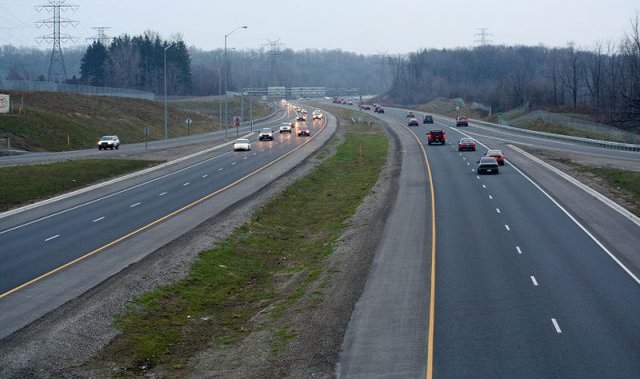Adjei
Senior Member
Why are the highways so dirty, don't they clean them, so much litter everywhere..
Why are the highways so dirty, don't they clean them, so much litter everywhere..
Crap gets caught in the snow drifts and only appears during/after the melt. Toronto just isnt as on the ball with street cleaning as others.Same for the parks and curbs... I remember a few weeks ago after the last snow and ice melted, the streets were brutally dirty; and not just with trash, but with god knows what stains and so forth. Over the pond, London, despite its vastly higher population and tourist volume, does a much better job of maintaining its public realm, at least in the city centre. That being said, their winters are much milder. It remains to be seen how they would cope with Toronto's freeze thaw cycles.
I was about to question your post until you added that. I agree. It's embarrassing to talk to recent immigrants and tourists, as the litter is one of the first things they notice, and then rightly question our priorities for the environment.it appears average people cared more 50 years ago than now
Both! My folks wasted very little. They composted long before it was popular in 'modern' Canada (we're immigrants), saved string and shopping bags long before it was 'hip again' and edible food was hardly ever discarded. The generation of Canadians prior to them did same! But Cdns of the last few generations haven't, save for folks well outside of urban areas, with few exceptions. It was the Thirties that left an impression on that Cdn generation, and the last Great War on my folks and that European generation. I remember rations in the UK up until the late Fifties, just a few years before emigrating.Is it that people cared more or that we now have so much packaging and disposable items?
I was about to question your post until you added that. I agree. It's embarrassing to talk to recent immigrants and tourists
See:Call Highways England on 0300 123 5000 to report litter spilling from vehicles or skips, on motorways and major A-roads. Litter is a big national problem and affects every corner of the country. According to Keep Britain Tidy, it's estimated to cost the taxpayer over £850 million a year to clear away.Aug 4, 2015
Litter on England's major roads - GOV.UK
https://www.gov.uk/government/collections/litter-on-englands-major-roads
https://www.globalcitizen.org/en/content/best-and-worst-recyclers-in-the-world/Data on global waste management is hard to gather in a meaningful way because there are so many sources, journeys, and endpoints for waste.
The plastic bottle you put in a recycling container in your home in New York goes on a different journey than the plastic bottle you toss into the wrought-iron trash container on the sidewalk of Dallas. When scaled to account for entire countries, these differences make data collection challenging.
But the Organization for Economic Cooperation and Development (OECD) has made a valiant effort to track municipal waste management throughout its 35 member states. And the results are striking.
Before we dig into the data, it’s important to note that municipal waste refers to household and commercial waste and accounts for just 10% of the total waste produced worldwide. Other types of waste include industrial wastes, agricultural wastes, medical waste, radioactive waste or sewage sludge
But municipal waste has an outsized effect on pollution and therefore soaks up a lot of waste management budgets. So getting a grip on this kind of waste is a big deal.
At the bottom of the list are Turkey and Chile, which each recycle an abysmal 1% of total waste, according to the report. They are also the only countries to have become worse at recycling since 2000, with 33% and 78% declines, respectively.
In Turkey, waste management is not a priority issue. Therefore, the vast majority of trash ends up in landfills. In Chile, unregulated dumping is common because the waste management system is spotty.
Germany, meanwhile, leads the pack with a 65% recycling rate, which has risen 16% since 2000. Germany is so good at recycling for a couple of reasons. First, the country has gone to considerable lengths to standardize recycling containersthroughout the country. There are color-coded containers all throughout the country that people adhere to. Second, Germans enjoy recycling and the sense of civic virtue it bestows. A culture of environmental sustainability reigns in the country.
In terms of countries making the most improvement, Poland is at the top of the list. It’s recycling an astounding 886% more of its waste than it was at the start of millennium. Estonia has increased its recycling by 600% in the same period, Ireland has increased by 261%, and the UK by 250%.
South Korea, Austria, Belgium, Slovenia, Sweden, and Switzerland have overall recycling rates above 50%.
The US has an overall recycling rate of 35% and the average throughout the OECD is 34%. [...]
/arc-anglerfish-tgam-prod-tgam.s3.amazonaws.com/public/D7PWLCMKRVBIJM6RNBPR4USJGU.JPG)
There is no doubt about the quantity. A lot. I don’t think that the quantity in any way, shape, or form gives anyone license to dispose of it by dropping it randomly on the ground or tossing it out a car window. I am disappointed to see both of these selfish and boorish behaviours. I thought we had been training the populace to put litter in its place for a couple of generations now.Is it that people cared more or that we now have so much packaging and disposable items?
Cigarette Butts. Cigarette butts make up a large part of Toronto's litter, can take years to break down and contain toxic chemicals that can be released into our environment. Toronto street litter/recycling bins have a special receptacle designated for cigarette butt disposal.
Litter – City of Toronto


Whoa! There's a deeper story in there somewhere....drivers who have crashed on the highway since its opening in 2007 blaming slippery asphalt.




